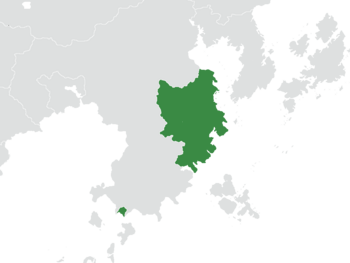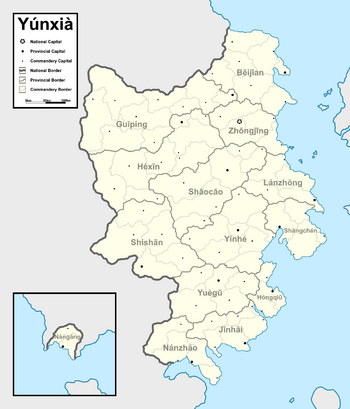Yunxia
This article is incomplete because it is pending further input from participants, or it is a work-in-progress by one author. Please comment on this article's talk page to share your input, comments and questions. Note: To contribute to this article, you may need to seek help from the author(s) of this page. |
Republic of Yúnxià | |
|---|---|
 | |
 Map of Yunxia | |
| Capital | Xījīng |
| Official language Regional languages | Xianese Dongese, Manzinese, Beian, Kitaganese, Tsurushimese |
| Demonym(s) | Yunxianese |
| Government | Presidential constitutional republic (de jure) Military administration (de facto) |
• Acting head of state | Generalissimo Fēng Zhīxīn |
• Legislature | National Council (suspended) |
| Establishment | |
• Republic of Yunxia | 1943 |
• Military administration | 1944 |
| Area | |
• Total | 1,096,990 km2 (423,550 sq mi) |
• Water (%) | 4.59 |
| Population | |
• 2024 census | 78,474,968 |
• Density | 71.5/km2 (185.2/sq mi) |
| GDP (nominal) | 2024 estimate |
• Total | $856 billion |
• Per capita | $10,905.31 |
| Gini | high |
| HDI (2024) | medium |
| Currency | Fēn (¥) (YXF) |
| Date format | yyyy-mm-d-dd |
| Driving side | right |
| Internet TLD | .yx |
The Republic of Yúnxià is a country in East Ochran. While ostensibly a constitutional republic, since 1944 the country has been governed by a military administration with devolved government along the lines of military districts and historic commandery districts. In practice, the regional governments are divided along cultural and geographic cliques, with significant warlordism beyond the core. Both reactionary and revolutionary elements exert significant influence across the country. The current head of the central government and the main Junting Army is Generalissimo Feng Zhixin.
Through most of modern history, the country of Yunxia formed the core of the Shenzhou Empire, a preeminent power in East Ochran. By the early 20th century, the Empire was reduced to a rump state in Yunxia. In 1940, the Empire was overthrown and the Republic of Yunxia was founded. Its first president was subsequently removed in 1944 by a military coup after an attempt to restore the Empire. Initially, the military administration had popular support. Over subsequent decades, the authority of the military administration based in the capital of Xījīng has eroded in favour of local populist movements and militias.
The economy of Yunxia is mixed both in terms of state interventions and development. In the vast hinterlands, a peasant agrarian economy is still commonplace. Closer to the capital, there is considerable industrial development with a focus manufacturing for an export market. The military administration has also designated a number of special international economic zones to promote financial services and foreign investment.
Culturally, Yunxia is a multi-ethnic country, though the majority of the population belong to various Shen sub-ethnicities. The Xianese make up a majority with significant Dongese and Manzinese minorities. The Beian and Kitaganese make up more marginal regional minorities.

